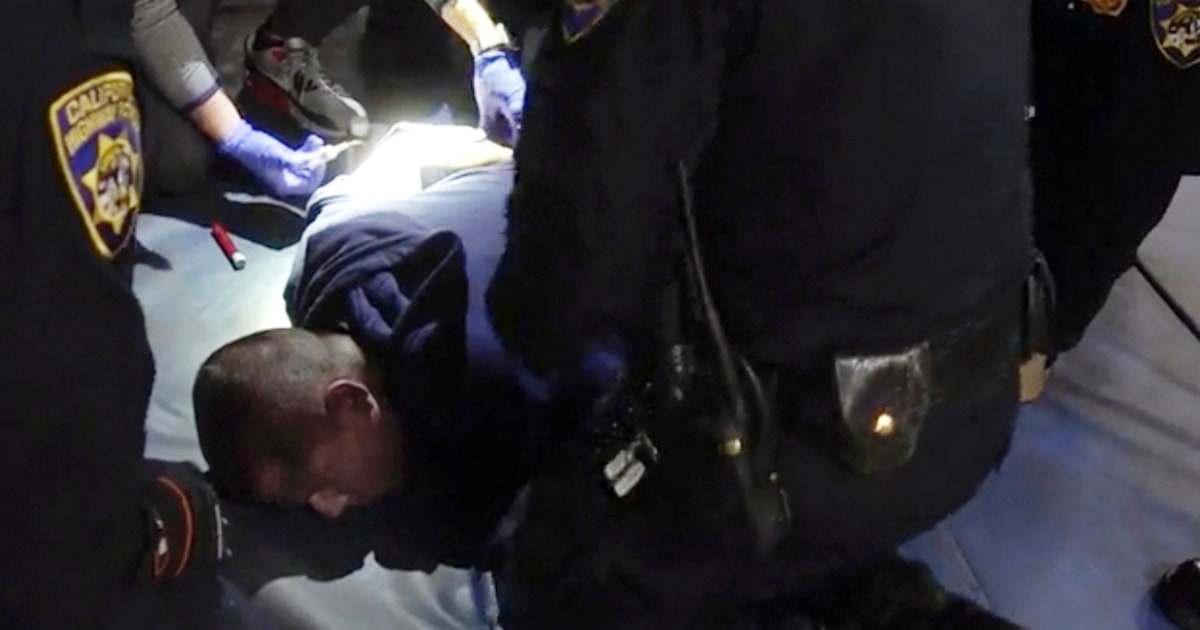LOS ANGELES (AP) — California will pay a $24 million civil rights settlement to the family of a man who died in police custody after yelling «I can’t breathe» as officers held him down as he tried to take a blood sample, lawyers said. on Tuesday.
Seven California Highway Patrol officers and a nurse were charged with manslaughter earlier this year in connection with the 2020 death of 38-year-old Edward Bronstein.
Annee Della Donna and Eric Dubin, attorneys for the young Bronstein children, said it is the largest civil rights settlement of its kind in the state of California and the second largest nationwide since the city of Minneapolis paid $27 million. in the case of George Floyd. The lawyers scheduled a press conference in Los Angeles for Wednesday to provide details.
The deal comes amid fresh scrutiny of potentially fatal restrictions following the death last week of a New York City subway rider, Jordan Neely, who was suffocated by a US Navy veteran. The death of Bronstein also echoes that of eric garner, a New Yorker who was suffocated by police in 2014 and whose last words “I can’t breathe” became a chant at protests against racial injustice. Both Garner and Neely were black.
The Los Angeles County coroner said Bronstein’s death was caused by «acute methamphetamine intoxication during police restraint.» The report lists Bronstein’s race as White.
Bronstein was taken into custody following a traffic stop on suspicion of drink driving on March 31, 2020. He died at a highway patrol station in Altadena, north of downtown Los Angeles, less than two months before for the police to kill Floyd in Minnesota. as he also repeatedly told officers: «I can’t breathe.»
Announcing the criminal charges in March, Los Angeles County District Attorney George Gascón said highway patrol officers failed Bronstein, «and their failure was criminally negligent, causing his death.»
One of the first 18 minute video showing the officers’ treatment of Bronstein was released last year following a judge’s order in the family’s federal lawsuit alleging excessive force and a violation of civil rights.
Family members have said Bronstein was terrified of needles and believe this is why he was initially reluctant to comply with the CHP when they attempted to take a blood sample.
The video, filmed by the sergeant, shows several officers forcing a handcuffed Bronstein to a mat on the floor as he yells: “I will do it willingly! I’ll do it willingly, I promise!»
He continues to scream as six officers hold him upside down (the lawsuit alleges they put their knees on his back) and calls for help.
«It’s too late,» an officer replies. «Stop screaming!» another screams.
«I can’t breathe!» and I can not!» Bronstein cries, and an officer responds: «Just relax and stop resisting!»
But Bronstein’s voice softens, then falls silent. Although he is unresponsive, the nurse continues to draw blood and the officers continue to restrain him.
After they realize he may not have a pulse and doesn’t appear to be breathing, they slap him across the face and say, «Edward, wake up.» More than 11 minutes after her last screams, CPR is started.
Bronstein never regained consciousness and was later pronounced dead.
In a statement, CHP Commissioner Sean Duryee expressed his condolences to the family and said he would respect the judicial process. His office did not immediately respond to a request for comment on the deal Tuesday.
The officers, who were placed on administrative leave in March, face one count of manslaughter and one felony count of assault under the color of authority. If convicted, they could receive up to four years in prison. The registered nurse was also charged with manslaughter.
Bronstein’s death prompted the CHP to change its policies to prevent officers «using techniques or methods of transportation that pose a substantial risk of positional asphyxia,» the agency said. Additional training for uniformed officers was also ordered.
In September 2021, Governor Gavin Newsom signed a law prohibit police from using certain upside-down keys that have led to multiple unwanted deaths. The bill was intended to expand the state’s ban on strangulation in the wake of Floyd’s murder.

